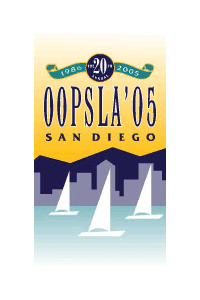

Artists and scientists both search for understanding. Their methods and approaches differ, and their results are in different languages, but there is no a priori reason to grant primacy to either. Art seems predicated on creativity while science and engineering are thought less so. The question arises what creativity is and whether creativity in the sciences and engineering is the same as in art. This workshop explores that and related questions.
We are at the crossroads. The work of computer science seems stymied; progress is steady but boring. It's time for something to happen—and any suitable something requires acts of creation. This year, OOPSLA's (hidden) underlying theme is creativity: Explore; Discover; Understand is its motto. A former poet laureate is the keynote. This workshop is aimed at understanding creativity from all angles. Is it the work of recluses, autistics? Are creatives stubborn, nonreligious, diligent, monotonous? Can creativity be triggered or managed? Is creativity the central act of art? Of science? Of design? Of engineering?
What about problem solving? And coding—does the surface look of creation reflect actual creation?
And what of understanding itself: Is understanding constructed/created? If so, what is understanding?
Are some software methodologies more conducive to creative thinking? Are our programming languages stifling in ways that our natural languages are not?
In this workshop we'll bring together musicians, artists, scientists, and software people to try to understand the source and role of creativity in the sciences and in computing.
Richard P. Gabriel (chair of the workshop and primary contact) received a PhD in Computer Science from Stanford University in 1981, and an MFA in Poetry from Warren Wilson College in 1998. He has been a researcher at Stanford University, company president and Chief Technical Officer at Lucid, Inc., vice president of Development at ParcPlace-Digitalk, a management consultant for several startups and Sun Microsystems, and Consulting Professor of Computer Science at Stanford University. He currently is principle investigator of the Self-Sustaining Systems research group at Sun Labs.
Richard will be organizing and leading the workshop. As a practicing poet, decent but difficult musician, and computer science researcher, he is in a good position to understand creativity across the board.
John Gribble has poems in recent issues of RUNES, The Mid-America Poetry Review, Pearl, and other publications in the US, UK, and Japan. A native Southern Californian, he has an MFA from Warren Wilson, teaches at both the Tokyo University of Fine Art and Music and at the Japan National Police Academy, and has reviewed poetry for The Daily Yomiuri. For twenty-five years he worked in the music world as a teacher, performer, composer, arranger, merchant, and in the field of Music Therapy. Now he plays mostly for himself, God, and to the annoyance of his wife and neighbors.
Brenda Laurel is a designer, researcher and writer. Her work focuses on interactive narrative, human-computer interaction, and cultural aspects of technology. Her career in human-computer interaction spans over twenty-five years. She holds an M.F.A. and Ph.D. in theatre from the Ohio State University. Brenda was one of the founding members of the research staff at Interval Research Corporation in Palo Alto, California, where she coordinated research activities exploring gender and technology, and where she co-produced and directed the Placeholder Virtual Reality project. She serves currently as Chair and graduate faculty member of the graduate Media Design Program at the Art Center College of Design in Pasadena, California, and also concurrently works as a Senior Director and Distinguished Engineer at Sun Microsystems Labs in Menlo Park, California.
In addition to reading the short essays, attendees will be required to write to be invited to the workshop, there will be some reading made available. Take a look at the previous two Extravagaria Workshops: 2002 and 2004.
The Wiki (read the next paragraph before trying to go there) will be available for pre-, during, and post-workshop use.
A Login and Password are required to access the wiki. Here is everything you need to know: Extravagaria was a collection of poetry written by Neruda (note capitalization). If you still need to know the Login and Password, please send email to extravagaria at dreamsongs.com.
This is a full-day workshop on Sunday, October 16, 2005, in the Eaton Room. There will be a minimum of formal presentations—perhaps only 2 or 3. The goal is to undrestand where creativity comes from and how it informs science, engineering, and design. We will do this by a series of facilitated brainstorming sessions and exercises. We will set up wiki during the workshop for taking notes and for additional interactivity. Here are how the workshop time will break down:
| 8:30–9:30 | formal presentations |
| 9:30–12:00 | exercises and discussion |
| 13:00–16:30 | exercises and discussion |
| 16:30–17:00 | consolidation |
The Wiki will remain alive after the workshop in hopes of continuing the investigation. We hope to write a paper on the topic after the workshop or perhaps a monograph.
Admission is by invitation only. We’re interested in exploring creativity in art, engineering, and science. We are also interested in a lively debate. There are two ways to be invited. One is to submit a short (a page is fine) piece responding to this call for participation—any genre is acceptable. We would especially appreciate a submission that enacts the themes of this workshop—fiction, paintings, poetry—but a simple essay will do. Add a short biography if we don’t know who you are. Email it by September 1, 2005, to Richard P. Gabriel (rpg at dreamsongs.com). The other is to start contributing to the Wiki, signing your statements and adding a page about yourself stating that you wish to be invited.
We’ll let you know by September 15, 2005 whether you are invited.